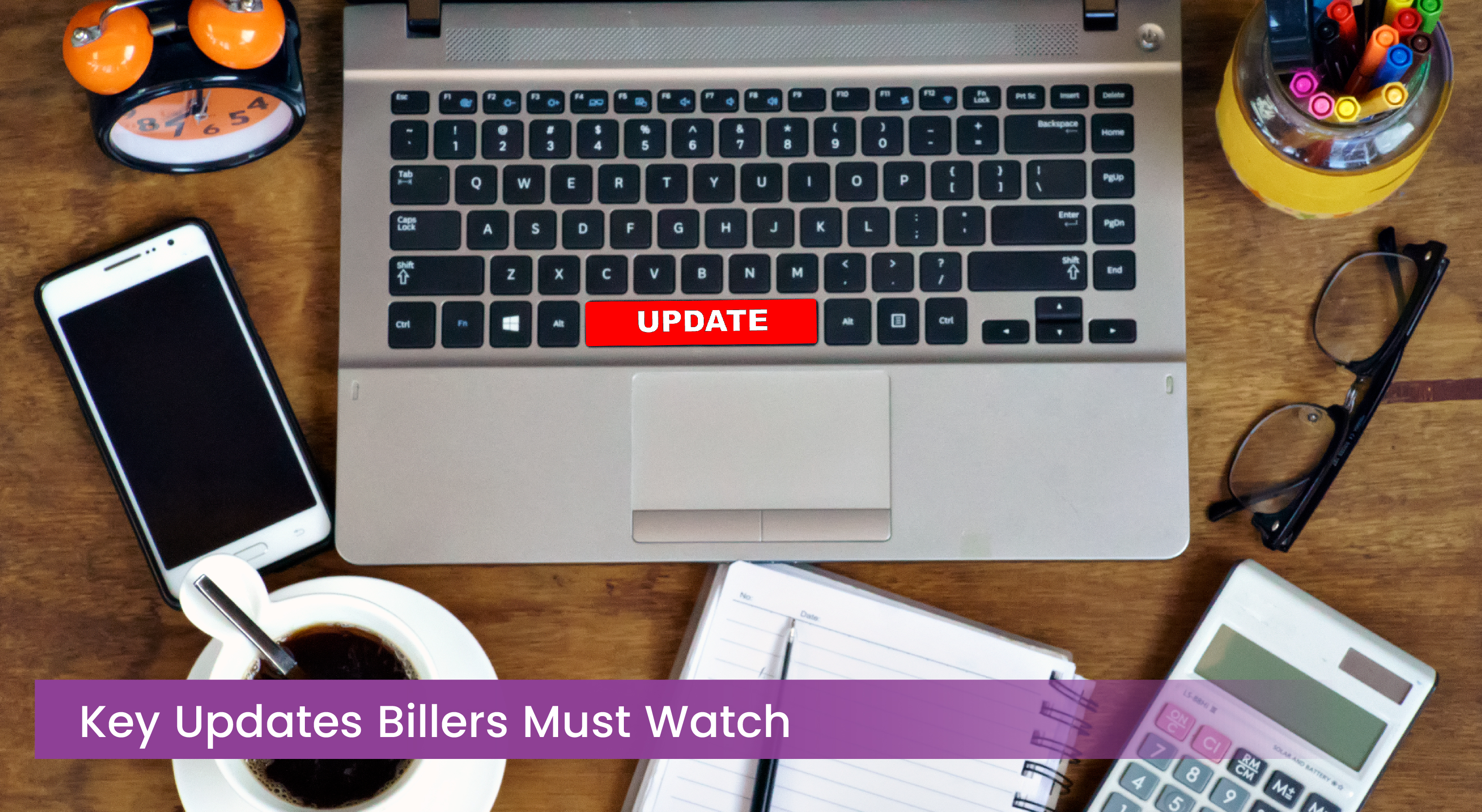
Top ICD-10 Coding Updates 2025: How U.S. Medical Billers Can Avoid Costly Claim Denials
By Billmate
Oct. 21, 2025, 6 a.m.
Introduction

In 2025, ICD-10 coding updates present both a challenge and an opportunity for U.S. medical billers. With new codes, deletions, and guideline changes, staying current is essential to avoid claim denial, ICD errors, and ensure your revenue cycle remains efficient. As the latest ICD-10 changes take effect throughout the U.S., clinics, hospitals, and billing teams must adapt quickly. In this post, we'll walk through the key 2025 updates, explain their impact on U.S. medical billing ICD codes, and share best practices to avoid costly claim denials.
What’s New in ICD-10 for 2025

October 1, 2025 Code Updates
The Centers for Medicare & Medicaid Services (CMS) has released the FY 2026 ICD-10-CM & PCS updates, which apply to services from October 1, 2025, to September 30, 2026.
Updates Effective October 1, 2024 (FY 2025)
Many of the changes used through 2025 began as of October 1, 2024:
-
252 new diagnosis codes
-
36 deletions
-
13 code revisions
-
These changes include conversion tables to map inactive codes to new ones.
Example: New codes for lymphoma remission, and additions in obesity and mental health codes
Note
For the April 1, 2025, release, there are no new diagnosis codes, but guideline changes, especially around COVID-19 coding, will apply.
Procedural / PCS Updates
The ICD-10 PCS (procedure codes) updates are under review for the October 2025 cycle. CMS has invited public comment for new procedure code proposals. These updates underscore the evolving nature of the code set and the need for vigilance in billing.
Why These Changes Matter to U.S. Medical Billers
Failing to adopt code updates can lead to:
-
Claim Denials ICD Errors: Using codes that are deleted or inactive triggers denials.
-
Underpayments: Billing with less specific codes may limit reimbursement.
-
Compliance Risks: Incorrect use of codes or misapplication of guidelines can draw audits.
The 2025 updates are not just administrative; they directly impact medical billing success and revenue cycle health.
Key Updates Billers Must Watch

Code Revisions & Deletions
Inactive or deleted codes are often overlooked but can be fatal to a claim. Use the 2025 Conversion Table to map deprecated codes to valid replacements.
New Codes for Specific Conditions
Certain areas expanded in 2025 include:
-
Lymphoma remission tracking
-
Mental health/eating disorder codes
-
Obesity codes in the pregnancy context
-
Guideline Changes (April 2025)
While no new codes debut on April 1, 2025, coding rules for COVID-19 change:
-
Only confirmed diagnosis counts (clinical confirmation)
-
A positive test alone is no longer sufficient without provider documentation
PCS Code Proposals
New procedure codes undergo public comment in Spring 2025. Billing teams should monitor emerging proposals for incorporation.
How to Avoid ICD-10 Claim Denials in 2025

-
Stay Up to Date with Code Lists & Guidelines
-
Subscribe to CMS / CDC updates
-
Regularly download the FY 2025 ICD-10-CM/PCS files from CMS/CDC
-
Compare old and new mapping tables before applying codes
-
Audit Your Code Usage
-
Identify codes you use frequently, and check if any are deprecated
-
Revisit medical specialties impacted by changes (e.g., oncology, obesity)
-
Use internal audit tools to flag outdated or non-compliant codes
-
Train Your Coding & Billing Staff
-
Conduct workshops on ICD-10 compliance USA
-
Share guideline changes, especially from April 2025
-
Use real case studies to illustrate claim denials tied to updates
-
Leverage Technology & Automated Tools
-
Use a billing system that auto-alerts for inactive or invalid codes
-
Integrate scrubbing and edits to prevent coding mismatch
-
Use AI/ML-assisted tools to recommend better specificity
-
Align with Documentation and Physician Notes
-
Encourage clinicians to document details (laterality, severity, timing)
-
Match documentation to the new code structure
-
Monitor Denial Patterns Quickly
-
Track denials tied to ICD errors
-
Analyze root causes (deleted code, wrong subcategory, guideline mismatch)
-
Adjust your claims resubmission to correct errors
Case Example: How One Clinic Avoided ICD Denials
A mid-sized gastroenterology clinic implemented the 2025 code update early. They:
-
Crosswalked their top 50 diagnosis codes
-
Trained staff on guideline changes
-
Enabled scrubbing of deprecated code
As a result, their first-pass acceptance rate jumped by 8% within the first quarter.
The Future: Automation & Smarter Coding

Emerging research is pushing the frontier of automated ICD-10 coding and predictive error detection. For example, a paper proposes using large language models (LLMs) to map clinical narratives to ICD-10 codes with improved accuracy and speed.
Such AI tools could serve as advisors, catching inconsistencies and improving coding precision, supporting human coders rather than replacing them.
Conclusion
With ICD-10 coding updates 2025 rolling out, U.S. medical billing teams must adapt swiftly. Using outdated or deleted codes is a leading cause of claim denial and ICD errors. By vigilantly updating coding systems, auditing common codes, training staff, leveraging technology, and aligning documentation, billers can avoid costly denials and ensure a smoother revenue cycle.
BillMate’s medical billing services stay ahead of these changes, offering accurate claim processing, real-time code validation, and denial prevention strategies.
Schedule Your Free Consultation Today with BillMate and ensure your billing stays compliant, denial-free, and revenue-optimized.
What To Read Next

By Billmate | February 23, 2026
Hospice Modifiers GV and GW: A Complete Guide for Medicare Billing
In-depth 2026 guide to hospice modifiers GV and GW, Medicare billing rules, documentation standards…

By Billmate | February 20, 2026
Tick Bite ICD-10 Codes and Billing Guide for Accurate Medical Coding
Complete guide to tick bite ICD-10 codes, Lyme disease coding, CPT tick removal billing, erythema m…

By Billmate | February 19, 2026
Denial Management in Medical Billing: Common Denials, Causes, and Prevention Strategies
Learn denial management in medical billing, common denials, eligibility denials, causes, prevention…

By Billmate | February 17, 2026
Mastering Revenue Cycle Management in Healthcare: A Comprehensive 2026 Guide
A comprehensive 2026 guide to revenue cycle management in healthcare, RCM in medical billing, hospi…

By Billmate | February 12, 2026
Patient Responsibility in Healthcare: How Providers Can Improve Collections Without Hurting Patient…
Learn how providers can improve patient responsibility collections without damaging trust, transpar…
Join our team to be a part
of our story
Learn more about our career, education and
posting jobs, and
submit simple application.